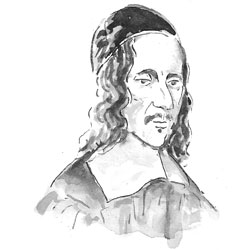Chapter VI (‘The Parson praying’) from The Priest to the Temple
[Text from George Herbert, The Priest to the Temple (London, 1652), pp. 17-20. Note: we have preserved the punctuation and the spelling ('then' for 'than', 'Judg' for 'Judge', etc.) of the 1652 edition.]
Chapter VI.
The Parson praying.
The Countrey Parson, when he is to read divine services, composeth himselfe to all possible reverence; lifting up his heart and hands, and eyes, and using all other gestures which may expresse a hearty, and unfeyned devotion. This he doth, first, as being truly touched and amazed with the Majesty of God, before whom he then presents himself; yet not as himself alone, but as presenting with himself the whole Congregation, whose sins he then beares, and brings with his own to the heavenly altar to be bathed, and washed in the sacred Laver of Christs blood. Secondly, as this is the true reason of his inward feare, so he is content to expresse this outwardly to the utmost of his power; that being first affected himself, hee may affect also his people, knowing that no Sermon moves them so much to a reverence, which they forget againe, when they come to pray, as a devout behaviour in the very act of praying. Accordingly his voyce is humble, his words treatable, and slow; yet not so slow neither, as to let the fervency of the supplicant hang and dy between speaking, but with a grave livelinesse, between fear and zeal, pausing yet pressing, he performes his duty. Besides his example, he having often instructed his people how to carry themselves in divine service, exacts of them all possible reverence, by no means enduring either talking, or sleeping, or gazing, or leaning, or halfe-kneeling, or any undutifull behaviour in them, but causing them, when they sit, or stand, or kneel, to do all in a strait, and steady posture, as attending to what is done in the Church, and every one, man, and child, answering aloud both Amen, and all other answers, which are on the Clerks and peoples part to answer; which answers also are to be done not in a hudling, or slubbering fashion, gaping, or scratching the head, or spitting even in the midst of their answer, but gently and pausably, thinking what they say; so that while they answer, As it was in the beginning, &c. they meditate as they speak, that God hath ever had his people, that have glorified him aswel as now, and that he shall have so for ever. And the like in other answers. This is that which the Apostle cals a reasonable service, Rom, 12. when we speak not as Parrats, without reason, or offer up such sacrifices as they did of old, which was of beasts devoyd of reason; but when we use our reason, and apply our powers to the service of him, that gives them. If there be any of the gentry or nobility of the Parish, who somtimes make it a piece of state not to come at the beginning of service with their poor neighbours, but at mid-prayers, both to their own loss, and of theirs also who gaze upon them when they come in, and neglect the present service of God, he by no means suffers it, but after divers gentle admonitions, if they persevere, he causes them to be presented: or if the poor Church-wardens be affrighted with their greatness, notwithstanding his instruction that they ought not to be so, but even to let the world sinke, so they do their duty; he presents them himself, only protesting to them, that not any ill will draws him to it, but the debt and obligation of his calling, being to obey God rather then men.
